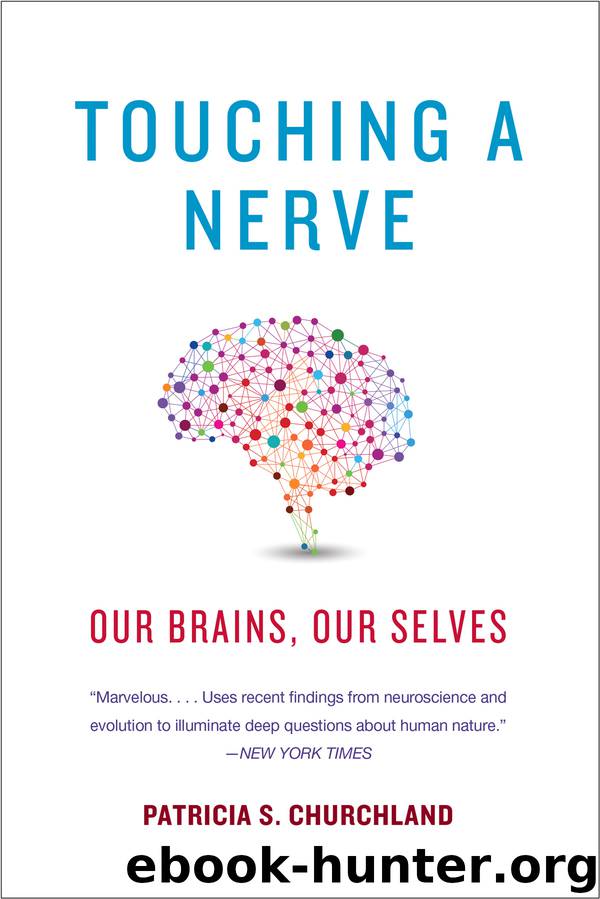Touching a Nerve by Patricia Churchland

Author:Patricia Churchland
Language: eng
Format: epub
Publisher: W. W. Norton & Company
Published: 2013-05-02T16:00:00+00:00
Chapter 7
Free Will, Habits, and Self-Control
BRAIN MECHANISMS FOR SELF-CONTROL
BUTCH FANCIED himself quite the ferocious watchdog. He was a terrier who belonged to the MacFarlanes, our kindly neighbors with a grand orchard to the south. Despite their reassurances that he would not bite, I could not but notice that when Jordie MacFarlane dropped by our house, Butch eagerly picked a fight with Ferguson, our German shepherd who was three times his size. The fighting was an event that called for a water hose, turned on full blast, something I may have focused largely on Butch.
Required to deliver two dozen eggs to Mrs. MacFarlane, I was instructed by my older sister: “No matter how frightened you are, never, ever run from Butch. Walk forward slowly when he thunders off the porch with teeth bared, look past him, and think serenely of something you really like to do. Never show fear. And don’t drop the eggs.” I practiced in the garden a few times, rehearsing especially not running, and trudged off. Butch did his worst, I thought of swimming in Osoyoos Lake, and my 5-year-old self outbluffed the hated Butch.
Butch mastered, more eggs were delivered past other fearful guardians, and eventually I found myself confronting worse adversaries—such as Patrick O’Donnell, who liked to bully the younger boys on the school bus. I think, Never show fear, and hit him hard on the noggin with my lunch box. Done. He stops. Mrs. McCormick, our bus driver, turned a blind eye and a deaf ear, bless her. Or, as a young professor, when a few male colleagues got about as much fun out of bullying female faculty as Butch got out of bullying me. Never show fear. Stay calm and carry on. Outlast the bastards.
In facing down Butch, I was learning lessons in self-control. I was growing the skills needed in facing assorted threats, just as generations of youngsters, humans and otherwise, have always done. Learning to exercise control is important not only concerning fears, but also concerning various temptations, impulses, emotions, and seductive choices. You learn to use imagination and rehearsal to achieve what seems so difficult. You take satisfaction when control works out well. You feel remorse when you lost control and paid a price. Habits form, so that you do not always have to work at maintaining control. Your brain’s control system gets stronger.
Much of early life is about learning self-control and acquiring the habits of suppressing costly impulses and doing things we would prefer not to. In acquiring these survival habits, we are guided by parents and mentors. “Chores first, play later,” “Serve guests first, yourself last,” and so on. Much of later life is about exercising control and allowing judgment its space to influence decisions. All those virtues we are encouraged to develop—courage, patience, persistence, skepticism, generosity, thrift, hard work, for example—are rooted in self-control. And these virtues are entirely real, not illusory in the way that Earth’s appearing to be flat is an illusion.
But what really is self-control? Plato
Download
This site does not store any files on its server. We only index and link to content provided by other sites. Please contact the content providers to delete copyright contents if any and email us, we'll remove relevant links or contents immediately.
Periodization Training for Sports by Tudor Bompa(8273)
Why We Sleep: Unlocking the Power of Sleep and Dreams by Matthew Walker(6725)
Paper Towns by Green John(5191)
The Immortal Life of Henrietta Lacks by Rebecca Skloot(4588)
The Sports Rules Book by Human Kinetics(4386)
Dynamic Alignment Through Imagery by Eric Franklin(4217)
ACSM's Complete Guide to Fitness & Health by ACSM(4060)
Kaplan MCAT Organic Chemistry Review: Created for MCAT 2015 (Kaplan Test Prep) by Kaplan(4012)
Livewired by David Eagleman(3774)
Introduction to Kinesiology by Shirl J. Hoffman(3772)
The Death of the Heart by Elizabeth Bowen(3622)
The River of Consciousness by Oliver Sacks(3604)
Alchemy and Alchemists by C. J. S. Thompson(3522)
Bad Pharma by Ben Goldacre(3428)
Descartes' Error by Antonio Damasio(3279)
The Emperor of All Maladies: A Biography of Cancer by Siddhartha Mukherjee(3163)
The Gene: An Intimate History by Siddhartha Mukherjee(3098)
The Fate of Rome: Climate, Disease, and the End of an Empire (The Princeton History of the Ancient World) by Kyle Harper(3067)
Kaplan MCAT Behavioral Sciences Review: Created for MCAT 2015 (Kaplan Test Prep) by Kaplan(2986)
